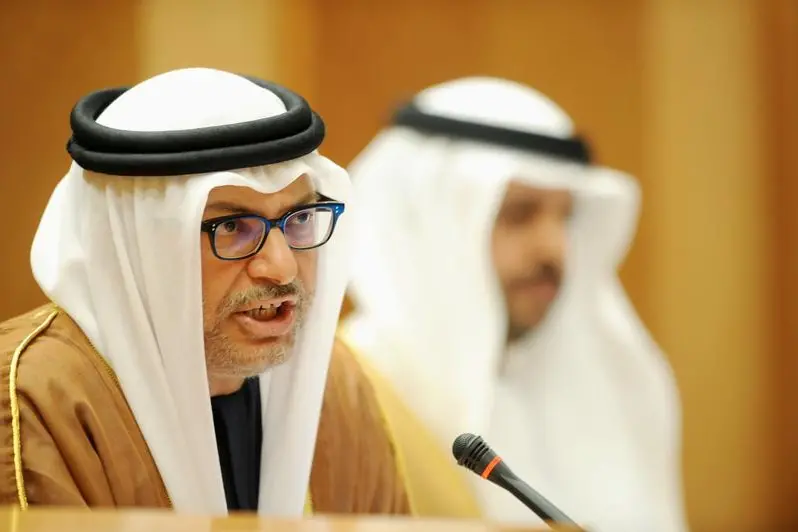PHOTO
19 June 2017
By John Irish
PARIS, June 19 (Reuters) - A senior United Arab Emirates (UAE) official said on Monday Qatar's powerful Arab neighbours could continue to isolate it "for years" if it did not alter its foreign policy and said a list of their grievances would be completed in the next days.
Saudi Arabia, the United Arab Emirates, Bahrain and Egypt cut diplomatic ties and transport links with Qatar on June 5 in the worst diplomatic crisis in the region in years.
The four countries accuse Qatar of fomenting instability in the Middle East, funding terrorism and cosying up to Shi'te power Iran, accusations that Qatar denies.
Kuwait is attempting to mediate, although scant progress has been made so far.
"The Kuwaiti mediation will be very useful and there will be demands coming," Anwar Gargash UAE Minister of State for Foreign Affairs told a small group of reporters in Paris. "Qatar will realise that this is a new state of affairs and isolation can last years.
"If they want to be isolated because of their perverted view of what their political role is, then let them be isolated. They are still in a phase of denial and anger."
Gargash said the priority concern was in dealing with Doha's links to al Qaeda-linked and other Islamist groups across the region as well as its ties to the Muslim Brotherhood and the Palestinian Hamas group.
EARLY DAYS
He said a list of grievances Arab nations had with Qatar would be completed in the next few days.
Qatar earlier on Monday dismissed the accusations against it as a "publicity stunt" aimed solely at sulllying its image and reputation.
"We don't really see an escalation, but isolation. You are part of our team, but you keep scoring an own goal," Gargash said, citing Qatar's support of militant groups in Libya, Yemen and Syria.
Gargash said there was a risk Iran and Turkey would try to fill the vacuum caused by the rift, but urged Ankara, which has supported Doha, to be neutral.
"It's early days. Turkey is trying to balance between its ideological zeal and its national interests. We are still in the phase and let's hope they are wise and understand that it's in its best interest...what we are doing," he said.
Gargash, who was in Paris as part of efforts to lobby European allies to put pressure on Doha, said he believed that when Qatar did back down, there would be a need to monitor its activities in the region, something Western powers could undertake.
"There is no trust. So far it's an idea to create a monitoring system...France, Britain, U.S. or Germany could monitor because they have the diplomatic clout and technical know-how," Gargash said.
(Reporting by John Irish; editing by Richard Lough and Ralph Boulton)© Reuters News 2017
By John Irish
PARIS, June 19 (Reuters) - A senior United Arab Emirates (UAE) official said on Monday Qatar's powerful Arab neighbours could continue to isolate it "for years" if it did not alter its foreign policy and said a list of their grievances would be completed in the next days.
Saudi Arabia, the United Arab Emirates, Bahrain and Egypt cut diplomatic ties and transport links with Qatar on June 5 in the worst diplomatic crisis in the region in years.
The four countries accuse Qatar of fomenting instability in the Middle East, funding terrorism and cosying up to Shi'te power Iran, accusations that Qatar denies.
Kuwait is attempting to mediate, although scant progress has been made so far.
"The Kuwaiti mediation will be very useful and there will be demands coming," Anwar Gargash UAE Minister of State for Foreign Affairs told a small group of reporters in Paris. "Qatar will realise that this is a new state of affairs and isolation can last years.
"If they want to be isolated because of their perverted view of what their political role is, then let them be isolated. They are still in a phase of denial and anger."
Gargash said the priority concern was in dealing with Doha's links to al Qaeda-linked and other Islamist groups across the region as well as its ties to the Muslim Brotherhood and the Palestinian Hamas group.
EARLY DAYS
He said a list of grievances Arab nations had with Qatar would be completed in the next few days.
Qatar earlier on Monday dismissed the accusations against it as a "publicity stunt" aimed solely at sulllying its image and reputation.
"We don't really see an escalation, but isolation. You are part of our team, but you keep scoring an own goal," Gargash said, citing Qatar's support of militant groups in Libya, Yemen and Syria.
Gargash said there was a risk Iran and Turkey would try to fill the vacuum caused by the rift, but urged Ankara, which has supported Doha, to be neutral.
"It's early days. Turkey is trying to balance between its ideological zeal and its national interests. We are still in the phase and let's hope they are wise and understand that it's in its best interest...what we are doing," he said.
Gargash, who was in Paris as part of efforts to lobby European allies to put pressure on Doha, said he believed that when Qatar did back down, there would be a need to monitor its activities in the region, something Western powers could undertake.
"There is no trust. So far it's an idea to create a monitoring system...France, Britain, U.S. or Germany could monitor because they have the diplomatic clout and technical know-how," Gargash said.
(Reporting by John Irish; editing by Richard Lough and Ralph Boulton)© Reuters News 2017





















